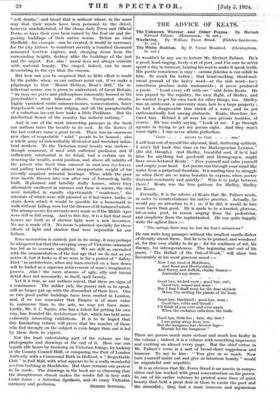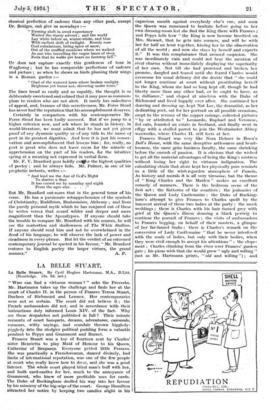THE ADVICE OF kEAT§. -
The Unknown Warrior< and Other Poems. By Herbori Edward Palmer. (Heinemann. 5s. net.)
Wayfaring. By William Force Stead. (Cobden-Sanderson.
IT wouldn't be any use to lecture Mr. Herbert Palmer. He's a good, loud-singing, lively scrt of poet, and I'm sure he never spent a day in torment, beating his soul to make it speak truth.
His poetic conscience is easy : curiosa felicitas is vox nihili to him. So much the better ; that heart-racking, blood-and-
sweat pursuit of the heavy word—or the rich word—mey sometimes produce noble monuments ; it never produced
a poem. " Load every rift with ore " said John Keats. • He was piqued by the rapidity, the easy flight, of Shelley, and he wanted to 'get his own back for other things, too. Shelley was an aristocrat, a university man, heir to a large property ; he had a disagreeable thin shriek of a voice, and he got enthusiastically lost among abstracts. Keats, therefore, lec-
tured him. Behind it all were his own private troubles, of course. He-was really saying, " Look at me. I go through agonies in trying to get my poems right. And they won't
come right ; I can never attain perfection.
' Gave . . . swaets to that . . . sun.
I will tear out of myself the abysmal, final, shattering epithets. I won't fall back this time on the Shakespearian Lexicon."
(He did, though.) And Shelley, beautiful soul, if he'd had time for anything but good-will and Dernogorgon, might have cross-lectured Keats : " Free yourself and calm yourself and empty your head. Let poems run through your mind like water from a perpetrial fountain. It is wasting time to struggle so when there are so many beauties to express, when poetry descends constantly and quickly." Who is to judge between them ? Keats was the true pattern for Shelley, Shelley
for. Keats. • Formally, it is the advice of Keats that Mi. Palmer needs,
in order to counterbalance his native practice. Actually, he would pay no attention to it ; or, if' he did, it would do him
more harm than good.- He is made to be a hurried, glorious, hit-or-miss poet, to rescue singing from the pedestrian,
and simplicity from the sophisticated. He can quite happily write the ugliest lines :--
" Two springs, there may be, but the first's unluscious."
He can write long passages without the smallest candle-flicker of divinity about them. But he is to be praised, and wondered at, for this very ability to let go ; for his readiness of wit, his fluency, his intemperateness. The beginning and end of his poem, " The Ballad of, the Out-of-Work," will show him favourably in his most gracious mood :—
" Now I am tired of Middlesex, And Kent and Hertfordshire, And Surrey.and Suffolk, chalky Sussex—.
Australia's my desire.
• • . . ; .
Good-bye, wicked crow ; - good bye, owl ; Good-bye, weasel and stoat !
Btit rfear I ilia weep for the dear skylark When I'm swilling the planks ofthe boat.
Good-bye, blackbird ; good-bye, wren ; Good-bye, robin and thrush !
I'll think of you over and over again When the cockatoo calls from the bush.
Good-bye, little fox ; fade, shy deer I am going away from you, But the kangaroo has cleverer legs— Hurrah for the kangaroo."
There are poems much more serious and much less faulty in the volume ; indeed, it is a volume with something impressive and exciting on almost every page. But the chief virtue in Mr. Palmer's verse is a sort of broad-sheet ruggedness and
humour. To say to him : " You give us so much. Now turn yourself inside out and give us laborious beauty" would be ungrateful and unpolitic.
It is as obviouS that Mr. Force. Stead is an ascetic in compo- sition and has 'Worked with great concentration,on his poems./ In one of his earlier volumes he printed some lines of quiet beauty that- held a great deal in them to excite the poet and the prosodiSt ; they had a more inwoven and mysterious
classical perfection of cadence than any other poet, except Dr. Bridges, call give us nowadays
Evening aloft in awed expectancy
Waited the starry advent ; and the world Lay white before us, winter.white, and' blue With earliest drift of twilight. Keenly rose CooLexhalations, biting spice of snow, -- Out of the muffled meadows where we walked As one who travelling the vague lanes of sleep Feels that he walks yet hears no footstep fall."
He does not capture - exactly this gentleness of tone in Wayfaring ; but he has comparable perfections of cadence and picture ; as when he shows us birds pluming their wings



















































 Previous page
Previous page